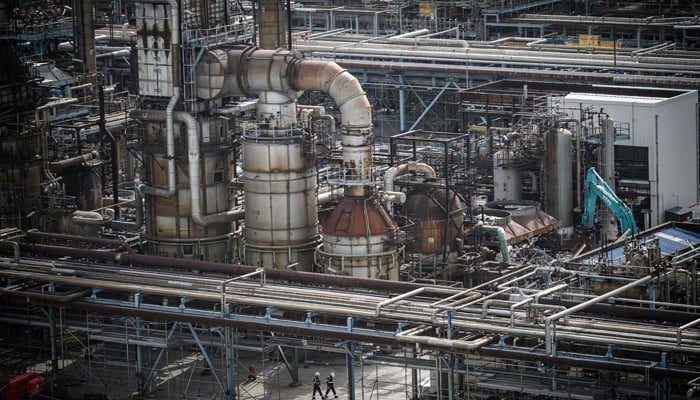Refineries irked by sales tax exemptions for imported petroleum products
KARACHI: The country’s refining sector has expressed concerns over the potential negative fallout of the government’s decision to exempt the supplies of imported petroleum products from sales tax for refineries.
In a letter to the Finance and Petroleum Divisions sent on June 29, the country’s five refineries pointed out that the exemption of motor spirit (petrol), high speed diesel, kerosene and light diesel oil (LDO) -- products that used to fall under the zero-rated category -- from sales tax will have a negative impact.
“This will effectively restrain the refineries from claiming 70 per cent of their input sales tax”, they said and added that refineries will not be able to claim the significant portion of their input sales tax paid on taxable purchases and services.
“This will also affect the bottom line of the refineries as the selling price of most of these products is regulated, therefore, the refineries cannot pass on the increased cost to their customers. The cumulative negative impact of this proposal is of such a magnitude that it will make the operations of the refineries unsustainable”, they said.
The letter said that the government recently announced the Pakistan Refining Policy for the Upgradation of Existing/Brownfield Refineries 2023 (Refining Policy), which provides various incentives to refineries for making huge investment in this sector within the specified strict timelines.
The refineries are undertaking the upgrade and expansion projects of $4.5 billion, which will significantly add value to the economy mainly through import substitution and employment generation. Through this measure, a huge amount of input tax to be paid on these project-related imports and purchases could not be claimed. This will significantly increase project cost which will make these projects unviable, according to refinery sector.
The sector argues that the refining policy announced by the federal government after years of hard work will become redundant and resultantly deprive the country of a huge investment of $4.5 billion.
The government’s act is counterproductive, as it will negatively impact the refineries by impairing their cash flows; increasing costs; and eliminating the value for the country and investors to invest in the refineries’ upgrade and expansion projects.
“We strongly oppose this and urge the federal government to retain the existing status of taxable supplies on petroleum products -- motor spirit (petrol), high speed diesel, kerosene and light diesel oil”, the refineries said.
People associated with the sector said that on the one hand, the government wanted to give incentives and on the other, it was taking them away through these changes.
-
 China Confirms Visa-free Travel For UK, Canada Nationals
China Confirms Visa-free Travel For UK, Canada Nationals -
 Inside Sarah Ferguson, Andrew Windsor's Emotional Collapse After Epstein Fallout
Inside Sarah Ferguson, Andrew Windsor's Emotional Collapse After Epstein Fallout -
 Bad Bunny's Star Power Explodes Tourism Searches For His Hometown
Bad Bunny's Star Power Explodes Tourism Searches For His Hometown -
 Jennifer Aniston Gives Peek Into Love Life With Cryptic Snap Of Jim Curtis
Jennifer Aniston Gives Peek Into Love Life With Cryptic Snap Of Jim Curtis -
 Prince Harry Turns Diana Into Content: ‘It Would Have Appalled Her To Be Repackaged For Profit’
Prince Harry Turns Diana Into Content: ‘It Would Have Appalled Her To Be Repackaged For Profit’ -
 Prince William's Love For His Three Children Revealed During Family Crisis
Prince William's Love For His Three Children Revealed During Family Crisis -
 Murder Suspect Kills Himself After Woman Found Dead In Missouri
Murder Suspect Kills Himself After Woman Found Dead In Missouri -
 Sarah Ferguson's Plea To Jeffrey Epstein Exposed In New Files
Sarah Ferguson's Plea To Jeffrey Epstein Exposed In New Files -
 Prince William Prepares For War Against Prince Harry: Nothing Is Off The Table Not Legal Ways Or His Influence
Prince William Prepares For War Against Prince Harry: Nothing Is Off The Table Not Legal Ways Or His Influence -
 'How To Get Away With Murder' Star Karla Souza Is Still Friends With THIS Costar
'How To Get Away With Murder' Star Karla Souza Is Still Friends With THIS Costar -
 Pal Reveals Prince William’s ‘disorienting’ Turmoil Over Kate’s Cancer: ‘You Saw In His Eyes & The Way He Held Himself’
Pal Reveals Prince William’s ‘disorienting’ Turmoil Over Kate’s Cancer: ‘You Saw In His Eyes & The Way He Held Himself’ -
 Poll Reveals Majority Of Americans' Views On Bad Bunny
Poll Reveals Majority Of Americans' Views On Bad Bunny -
 Wiz Khalifa Thanks Aimee Aguilar For 'supporting Though Worst' After Dad's Death
Wiz Khalifa Thanks Aimee Aguilar For 'supporting Though Worst' After Dad's Death -
 Man Convicted After DNA Links Him To 20-year-old Rape Case
Man Convicted After DNA Links Him To 20-year-old Rape Case -
 Royal Expert Shares Update In Kate Middleton's Relationship With Princess Eugenie, Beatrice
Royal Expert Shares Update In Kate Middleton's Relationship With Princess Eugenie, Beatrice -
 Andrew Mountbatten-Windsor’s Leaves King Charles With No Choice: ‘Its’ Not Business As Usual’
Andrew Mountbatten-Windsor’s Leaves King Charles With No Choice: ‘Its’ Not Business As Usual’




